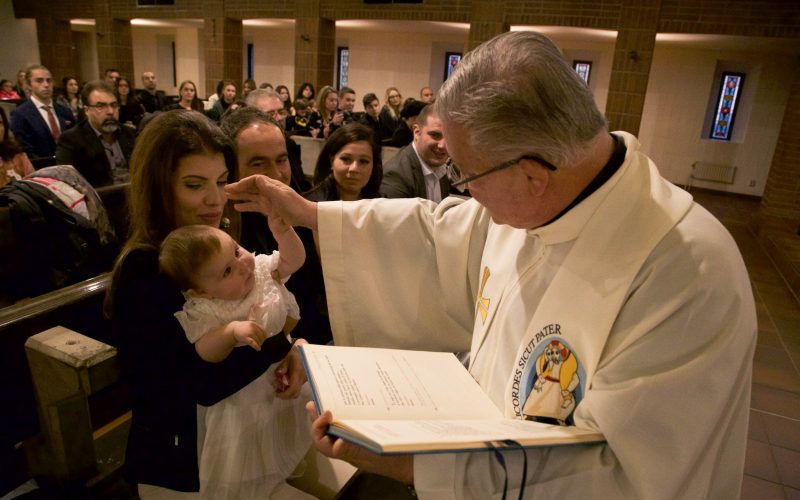The Reformation’s divisions still mark Sweden – as the Pope’s visit shows
His visit should not make us gloss over the very real issues facing both Catholics and Protestants
Oct 31, 2016

VATICAN CITY: This Monday will mark the second time in history that a pope has visited Sweden. The last time was when Pope John Paul II came in 1989. Since then, times have changed for the Catholic Church in Sweden.
In the 1980s the Church was generally seen as a foreign entity with all the precautions and suspicions that followed the Reformation. That reformation was not much debated but rather intrinsically interwoven into the fabric of Swedish society.
Sweden, by tradition a staunch Protestant nation, is now one of the most secular nations in the world, but still with some strong religious elements within it. The Catholic Church was at best seen as an exotic element, mainly made up by immigrants, and at worst as a lurking danger for both secular and religious society because of its “superstition and lust for intrigue and power”.
A few conversions in recent years have provoked surprise: some intellectuals and a few High Church priests have disavowed the Lutheran state church. Lutheranism, in a rather liberal, modernistic and cautiously Low Church form, has dominated the religious landscape in Sweden for many years.
In 1998 a Swedish Catholic bishop, Anders Arborelius, was installed for the first time since the Reformation. This propelled further a development already on its way in changing attitudes towards the Catholic Church. To some surprise, this change was more evident in the free churches than in the Lutheran state church. For the Lutheran Church, a Swedish Catholic bishop could be perceived more as a threat than a German one, who would rather accentuate the status of the Catholic Church as an immigrant church.
In the year 2000 the Lutheran Church was finally separated from the state. But not really, since the political parties of the Swedish parliament continued to be the political body and deciding factor within the Lutheran Church even after the separation. In one way the church became even more politicised.
Among the free churches (“free” meaning originally free from governmental influence) a more recent search for roots and deeper identity has resulted in a variety of initiatives of befriending the Catholic Church. For many free church pastors, Bishop Anders Arborelius stands out as a unique spiritual leader recognised as such by many who otherwise would not ecclesiologically accept the term “bishop”.
The latest to convert to Catholicism is the important ecumenical Lutheran community of Berget (“The Mountain”). This is an influential community that through its well-known retreats and broad network has had a huge influence on Swedish spirituality over many years. The community’s conversion was sharply criticised by several Lutheran bishops, including the female Archbishop Antje Jackelen.
Another recent important event was the canonisation of the second saint in Swedish history, St Mary Elizabeth Hesselblad, in June. The event was shown live on the major television channels and enthusiastically embraced. Many Swedes were quite curious to find out what a Catholic saint actually is.
So, much has changed. And into this spiritual landscape Pope Francis will arrive on October 31. He comes for the commemoration of the Reformation, invited not just by Swedish Lutherans but also by the World Lutheran Federation, made up of 145 different Lutheran denominations.
The great schism in European and Swedish history is still an open wound and a stigma, even though the talks between Lutherans and the Catholic Church have resulted in a document, “From Conflict to Communion” – a promising title.
At first it was intended that Pope Francis would come only for the Reformation commemoration, with no Mass for the Swedish Catholics. According to some sources, the Lutherans were against him celebrating a Catholic Mass as they found it “divisive”.
The plans did however change, though not without some friction, and Pope Francis will celebrate Mass for his flock. Nineteen-thousand people will come. Not being able to partake in one another’s Communion is still a very present stigma and some wonder whether this Pope will take a step towards intercommunion – which is certainly not plausible.
So will the Pope’s visit in Sweden matter? Yes, on several levels. It is historic and has acquired much attention. Some do accuse the planning committee of trying to use the Pope to forward their liberal agenda, especially on LGBT issues. Others believe the Pope’s visit is just another “side-tracking from the issues” and the deadlock in ecumenism. Others are worried that he will gloss over the serious and issues that go way back to the 95 Theses put forth by Luther in Wittenberg in 1517.
When the Pope arrives in Lund, the small university town where the Lutheran World Federation, an ecumenical initiative, started 50 years ago, he will certainly take centre stage, maybe more than some organisers might want.
The ministry of the Successor of Peter is, of course, a subject of dispute in Sweden, an emotional sore spot for so many Protestants and an impossible theological hurdle for others. In the wake of increased interest in the Catholic Church and a number of recent conversions some ultra-Protestants are even suggesting that the Vatican is making an improper advance towards Sweden.
Some words from Pope St John Paul II sum up the situation well: “Emotionally the Protestants stand closer than ever to the Catholic Church, but dogmatically they are still far apart.”
This is the dilemma for Pope Francis in Sweden. The hope is that the quest for unity penetrates deeper, in both truth and love, to the very core, to the real issues, as brothers and sisters on both sides must grapple with what really happened in those fateful years in the early 1500s that so dramatically tore the Church apart.
To go on, to look forward, to seek communion cannot mean a glossing over and not dealing seriously with issues that still are very divisive. --Catholic Herald







Total Comments:0